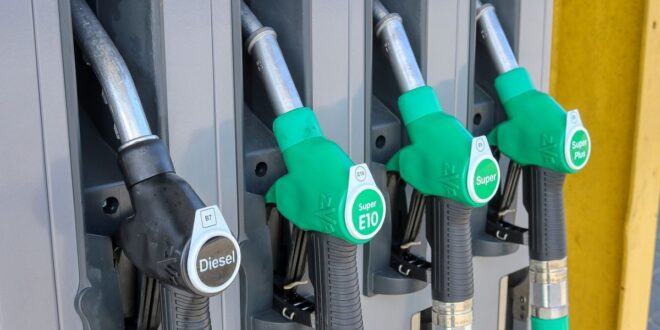We use two major fuels to power our vehicles today, gasoline and diesel. These fuels have different chemical makeup, and their engines are also built differently. At times, we may accidentally pump the wrong fuel into our vehicles, which may be worrying. What happens if you put gasoline into a diesel engine?
Generally, if you put gas in a diesel engine, your engine may not ignite. Your diesel engine will also not receive lubrication, and the fuel system may be damaged. The odd ignition may also damage many internal engine parts such as pistons and rods. Your vehicle will also emit thick, black smoke.
This article discusses gasoline, diesel, and what happens if you accidentally add gasoline to a diesel engine. We also discuss how diesel and gasoline engines differ and what you should do if you accidentally add the wrong fuel to your engine.
What Is Gasoline?
Gasoline is a transparent liquid used as fuel to power spark-ignited, internal combustion engines. Gasoline is refined from crude petroleum, and additives are added to improve its performance. Higher octane gasoline usually has additional retardant agents to improve efficiency and performance.
Gasoline is a type of fuel used in spark-ignited, internal combustion engines. It is liquid, transparent, and made of petroleum. In many regions outside of the US, gasoline is also called petrol.
The first oil well was dug up by Edwin Drake in Pennsylvania in 1859. At the time, gasoline was originally a byproduct of kerosene production. Kerosene was used extensively for kerosene lamps. As a result, gasoline was usually thrown away.
It wasn’t until German engineer Karl Friedrich Michael Vaillant Benz built the first gasoline motor in 1879 that gasoline finally found a use. With the advent of automobiles, it took another 20 or so years to finally make gasoline popular.
When refining raw petroleum, one of the largest byproducts is gasoline. For every barrel of crude oil, about 19-20 gallons (86 – 91 L approx.) of gasoline is produced. Earlier processing involves distilling crude petroleum to separate gasoline from other types of fuels. However, modern processing employs the cracking method to improve yields.
Once produced, this new gasoline is mixed with additives, to create gasoline suitable for vehicle engines. Additives include detergents to reduce carbon buildup, antioxidants to reduce engine ‘gum’ formation, and many more.
The most common additive added is the retardant, which helps to control premature ignition of the gasoline in the engine. These are usually expressed in octane numbers, with a higher number indicating better performance overall. As a result, higher octane fuel may be more expensive than usual.
These additives and formulations added into gasoline are what separate retail gasoline brands from each other. Modern gasoline also started seeing the addition of ethanol to produce gasohol, to reduce reliance on petroleum.
What Is Diesel?
Diesel is a liquid fuel used in compression-ignition engines. This type of fuel is commonly made from crude petroleum but can be made from many other sources, including vegetable and animal fat; diesel fuel is used extensively in heavier industrial vehicles such as trucks, rail cars, or tractors.
Diesel is a type of fuel used in compression-ignition engines or known as diesel engines. It is named after its inventor, Rudolf Diesel. In fact, Rudolf Diesel invented the compression-ignition engine as well.
Unlike gasoline, diesel fuel can be made from different sources, not just petroleum. Petroleum diesel is the most common and is made from processing petroleum. A barrel of crude oil produces around 11-12 gallons (50 – 55 L approx.) of diesel.
Synthetic diesel is made by gasifying any carbonaceous material, such as biogas, coal, natural gas, or others. This gas is then converted into synthetic diesel. Synthetic diesel is usually cleaner than petroleum diesel as it has lower emissions.
Biodiesel can be made from any oil, vegetable, or animal. The process includes adding methanol or ethanol to transesterify it into biodiesel. In many cases, biodiesel is mixed with petroleum diesel, although pure biodiesel can be used with approved diesel engines.
Diesel is used much more widely in many more engines than gasoline. Most heavier vehicles rely on diesel, from pickup trucks to tractors. Diesel is also popular with railcars, replacing coal as it is much cleaner than burning coal.
Compared to older formulations, modern diesel tends to have lower sulfur content, to reduce and control emissions. The current Euro 5 standard sets sulfur content at a maximum of 10 ppm (parts-per-million.)
Diesel is also more stable than gasoline and does not tend to cause knocking, so there is no need to add retardants. This also explains why there are no octane ratings for diesel.
You may like this article: What Color Is Transmission Fluid?
How Is Gasoline Different From Diesel?
Gasoline differs from diesel in sources, production, energy density, usage, and price. These eventually cause both fuels to have different performances and be used on different types of vehicles.
As a start, gasoline and diesel are the same in that they are the fuel used to power engines. They contain energy that can be converted into kinetic energy to move engines and vehicles.
However, the similarities end there. There is a reason why gasoline and diesel remain popular today, as they serve different markets and vehicle needs. Gasoline and diesel can differ in many ways:
Sources
Gasoline is usually derived from crude petroleum. There are methods to produce synthetic gasoline, but this is not a popular process, as it significantly increases the cost of gasoline.
Diesel is commonly made from petroleum, but there are other ways to produce diesel. It may be more common to see non-petroleum diesel used than non-petroleum gasoline.
One of the most common methods to make non-petroleum diesel is to use vegetable or animal fat. These fats are then mixed with either methanol or ethanol, a process called transesterification. The resulting diesel is called biodiesel.
Biodiesel is commonly mixed with petroleum diesel to make it cheaper, although approved engines could use 100% biodiesel as well.
Production
Gasoline can only be made from carbon deposits, commonly petroleum. It is possible to make synthetic gasoline from other carbonaceous materials, such as coal or natural gas. Still, they are not popular and can be expensive.
Diesel can be made from any carbon deposits, similar to gasoline. Most diesel fuel is made from petroleum, although synthetic diesel made from coal or natural gas can be found.
However, diesel can also be made using vegetable or animal fat, something the gasoline cannot match. Common ingredients include corn, soybean, palm oil, and animal fat wastes.
Energy Density
Energy density refers to the amount of stored energy in a given volume of an item. An item with higher energy density will have more energy stored, likely making it more energy efficient.
If you compare gasoline and diesel, diesel has a higher energy density. This is because a gallon (3.78L approx.) of diesel produces 147,000 BTU (British Thermal Unit) energy. Compared to gasoline, a gallon of it only makes around 125,000 BTU of energy.
This means if you fill a car with a similar amount of diesel or gasoline, the diesel vehicle could travel further since it uses less fuel per mile.
With higher energy density, the vehicle could also extract more energy quickly, meaning diesel could give the vehicle more torque. Torque refers to the initial pull force important to move heavier vehicles.
Use
When you look at how diesel is more fuel efficient and allows higher torque, it makes sense why most heavier vehicles use diesel by default. Gasoline may be popular with passenger cars or motorcycles. Still, once you move up to pickup trucks, you start to see diesel models.
For anything heavier than that, diesel is practically the default. Trucks, tractors, railcars, and ships use almost exclusively diesel.
These vehicles are usually heavy and may be used to tow as well. As a result, high torque is very important. Diesel can do this better than gasoline, which makes these vehicles use diesel.
Another point is that these heavier vehicles, such as semis or delivery trucks, tend to travel long distances. By using diesel, they can fill up less since diesel fuel is more energy efficient.
Price
In many cases, diesel may be more expensive than gasoline. This is because diesel is less in demand compared to gasoline. There are many more passenger cars and motorcycles on the road than trucks, tractors, and train cars.
This means diesel refiners cannot benefit from economies of scale as much as gasoline refiners. As a result, they may have to sell diesel at a higher price.
Another reason is taxes. Federal taxes on diesel are higher than on gasoline, possibly because diesel is used by commercial vehicles. It may be easier to tax businesses than to tax individuals running gasoline cars, which causes diesel to be more expensive.
How Is A Gasoline Engine Different From a Diesel Engine?
Gasoline engines differ from diesel engines in how they work, size, and durability. These differences eventually contributed to passenger cars preferring gasoline engines and commercial vehicles preferring diesel engines.
Ignition
Diesel and gasoline engines differ the most in the way they work. Diesel engine ignites through compression, while gasoline engine ignites through spark.
With a diesel engine, the pistons move up, compressing air. The injector then sprays some diesel. When compressed at a high level, this diesel and air mix ignite, causing an explosion that pushes the pistons down.
With a gasoline engine. Injectors spray gasoline, and the pistons move up, compressing the air. The compressed gasoline and air mix are ignited when the spark plug creates a spark. The explosion pushes the pistons down, and the process repeats.
Size
In general, diesel engines tend to be bigger, with higher displacement. Diesel engines may start from 1.5 liters and above. With gasoline engines, it could be small enough to fit into a motorcycle or lawn mower.
This is probably because diesel engines are used in heavier, larger vehicles that need more moving power. Gasoline engines are usually used in passenger cars and motorcycles, meaning they would not need a large displacement.
Durability
Generally, you can assume diesel engines tend to be more durable than gasoline engines. There are several reasons for this, such as the engine and the nature of diesel.
This is because diesel engines are made to be more robust. It is bigger, so the pistons, rods, and gears are also bigger and tougher. It also has fewer parts compared to gasoline engines. As a result, diesel engines tend to last longer.
Another reason is the diesel fuel itself. Despite being a liquid, it has the characteristics of a light oil. As it burns inside the engine, it also lubricates and protects the engine. Gasoline, instead, is more of a solvent. As it burns, it erodes the engine’s surface over time.
Combined, this explains why a diesel engine may have a lifespan of over 300,000 miles or more before needing service. In fact, it is not abnormal to see 1,000,000-mile diesel engines that do not require major overhauling work.
What Happens If You Put Gas To Diesel Engine?
If you add gas to the diesel engine, your engine may not run. If you force to run an engine with mixed gasoline and diesel fuel, your vehicle will also emit thick, black smoke. The odd ignition timing may also damage many internal engine parts, such as fuel systems, pistons, and rods.
After looking at diesel, gasoline, and their respective engines, you can see why you should not use them interchangeably. Diesel engines cannot run on gasoline, and gasoline engines should not try to run on diesel.
However, what happens if you try to? As a start, when you combine gasoline and diesel, the immediate effect is you lower the ignition temperature, which may cause many issues and damages along the way.
No Ignition
As a start, your vehicle may fail to start. This is because, unlike diesel, gasoline requires sparks to ignite it. Since diesel engines do not carry spark plugs, your engine may not start.
This is much more likely if you add a large amount of gasoline to a small amount of diesel in your vehicle. This is possible since most of us only visit the pump when we run low on fuel.
If there is more diesel than gasoline, you may be able to start your engine, but the combustion will not be good. You will notice odd engine performance and heavy emissions.
Thick, Black Smoke
Gasoline usually has an octane rating of 85-100, while diesel usually has an octane rating of 25. This means diesel will ignite much more easily compared to gasoline.
When you mix gasoline and diesel into a diesel engine, the diesel fuel will ignite much easier since it has a lower octane rating. The gasoline may not even have a chance to ignite, so your engine may not have a clean burn.
This unburned gasoline may appear as thick, black smoke on your vehicle. The smell will be rather terrible as well. The thick black smoke also contains a lot of soot, which may cause your sensors and parts of your engine to malfunction.
Fuel System Damage
Gasoline is a more volatile solvent, while diesel can be considered a light oil with lubricating properties. This means when gasoline travels through a diesel fuel system, it may easily damage it.
Your fuel system includes parts such as diesel pumps, injectors, and filters. If you have turned on your engine and run gasoline through these engine parts, have them inspected to ensure no damage has been done to them.
Internal Engine Damage
When gasoline enters a diesel engine, it messes up the engine’s ignition timing. This may affect the synchronization of the parts inside the engine, causing them to knock against each other.
As a result, parts of the engine may be damaged, such as the pistons, valves, and gaskets. Replacing these parts usually requires major rebuilding, which may cost money and time.
You may like this article: How Many Spark Plugs Does A Diesel Engine Have?
What Should You Do If You Put Gas To A Diesel Engine?
Do not turn on the engine if you have mixed gasoline into a diesel engine. Call for a tow truck to tow your car to a workshop, and have them drain away and clean any of the fuel inside. If you have turned on your engine, request that the workshop check your fuel system to see if there are any damages.
Most of the time, gas and diesel are well marked at the gas station, and most vehicles also mark the fuel types clearly on the gas cap. However, mistakes can happen, and if you accidentally add gasoline to your diesel vehicle, take these steps:
Do Not Start
If you have ended up pumping gasoline into your diesel vehicle, remember to not start your vehicle. The reason is simple. You do not want to introduce gasoline into your engine.
When you pump in gasoline, the fuel travels from your pump to your vehicle’s fuel tank. If you do not start your vehicle, the gasoline stays there and will not go further into your engine.
If you start your engine, the fuel may start sucking in fuel from the tank, meaning gasoline is not sucked into your fuel system and engine, which may cause more damage.
Turn Off Engine Immediately
If you had turned on your diesel vehicle and may have driven a bit before you realized your mistake, turn off the engine immediately. This is because gasoline has already been introduced to your diesel engine, meaning there may already be possible damage.
Simply driving further may only exacerbate the damage, which means you want to turn off the engine and stop more gasoline from entering your engine. However, as you turn off your engine, remember to park at a safe place and practice safety measures.
Tow Vehicle To Workshop
Next, you get a tow vehicle to bring your vehicle to the nearest workshop. This is because you do not want to drive the vehicle any further. Depending on your vehicle insurance, you may be able to call for a free tow truck. If not, ask the local highway patrol or gas station for any number to call.
Drain The Fuel Tank
The first thing you want to do when your vehicle arrives at a workshop is to tell them what happened and if you have started your car. If you have driven your vehicle for a distance, mention that.
If you have not turned on your engine, the mechanic will likely only drain the fuel tank in your vehicle. The mechanic may then give it a clean-up to remove any remaining gasoline. Once dried, you refill the tank with diesel, and you should be good to go.
Inspect Fuel System And Engine
However, gasoline may have entered your fuel and engine system if you have driven your vehicle. In this case, you may need the mechanic to help you inspect if the fuel system has been damaged by the gasoline or not.
The mechanic may test and inspect the fuel pumps and see if they still perform. If yes, the mechanic will try to run some diesel into the pump to clean up and remove any gasoline. It is advisable to install a new fuel filter.
At this point, your best bet is for the gasoline to not wreck too much damage inside your engine. If your vehicle runs smoothly after draining the fuel tank and servicing the fuel system, you should be ok.
 Being Human
Being Human





